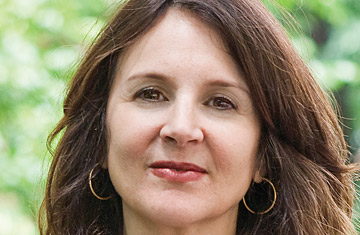
For more than two decades, Jill Bialosky, a New York City novelist, poet and editor, has tried to understand her sister Kim's suicide. In April 1990, Kim came home after a fight with her boyfriend, closed the door to the family garage in Cleveland, and asphyxiated herself; she was 21 years old. Now, in her new memoir, History of a Suicide: My Sister's Unfinished Life (Atria), Bialosky attempts to explain her sister's death in a way that can help others coping with depression or loss. Writes Bialosky, "Since I cannot bring her back, I have struggled to make her lapse into darkness and the devastation of suicide understandable." TIME senior reporter Andrea Sachs met with the author in Manhattan.
Why did you decide to write the book now?
I started writing the book eight years ago, and I just felt the persistence to do it. I can't explain it any other way, except that maybe being a writer, being a poet and a novelist, I just could not not write this, not try to examine what happened to my sister its impact on me and my family. I also think that writing becomes a way of organizing chaos, organizing and trying to shape an understanding of something that is so mysterious ultimately.
Did Kim's death bring your family closer or did it drive you apart?
I do think that initially, that journey to deal with the grief of losing a loved one to suicide is very personal. It's something that you have to go through on your own. But I think the fact that we share this deep tragedy has brought us closer as a family.
Did Kim seemed sunnier to people outside of your family than was actually true? Was she more upbeat around other people or were her underlying feelings somewhat evident?
I don't think so. I mean, maybe to her close friends. But she did present as being very outgoing and fun-loving and funny. She had a sense of humor and playfulness.
What was it like to go back through all of the details of her suicide?
I think there were periods when it was tremendously hard, and then there were also periods when it was very uplifting for me in writing the book. Especially writing about Kim's younger years. She was such an adorable child that bringing her younger self to life was very heartwarming to me. It was bittersweet.
Have you spoken with a lot of people who have had family members who committed suicide?
Yes. I write in the book about going to the suicide survivor group for family members and loved ones who've lost people to suicide. And that experience really opened a door for me because I came to realize that there are very similar themes that are echoed in survivors.
What are those?
First of all, there's always the sense of guilt and responsibility and "if only." If only this would have happened, would we have been able to change things? So there is that sense of living with the horror and grief and tragedy of suicide. And also this idea that you suddenly feel as if you don't know anybody anymore, because you think, Oh, I knew this person so well and we were so close — how did this terrible thing happen and we missed it? This very common feeling that people experience is of really feeling like they have to reestablish who they are in the world and their relationships to people. And I think it does force you to think more about the inner lives of those you know and care about.
How does your family feel about you writing this book?
They were very supportive. I'm very lucky that my sisters and my mother really understood my need to write the book and gave it their blessing. I was very conscious of trying to write about this and also trying to keep their privacy.
What else would you like people to understand about suicide?
My hope might be that this book will help open the conversation about suicide and to remove this veil of shame. It's as if the suicide has to pay again for her actions by being silenced. I do think that in our culture, there is difficulty in understanding suicide. I hope that my book will allow people to understand that this act is something that could happen to anyone, and that lot of different circumstances are at play.
Having gone through this whole process, did it leave you with a feeling of understanding?
I do think that I have come to understand certain things about suicide and about what happened. I do feel strongly that there's no closure in any kind of grief. We continue in life and as we mature and grow, we experience the world differently and those we've lost become a part of that reality. But I do feel that piecing together this story has helped me lift some of the chaotic, overwhelming feelings that suicide provokes.
